51% of likely voters say they personally, a family member, and/or a close friend has a disability
NEW bipartisan poll of likely voters presented by top pollsters, Democratic pollster Stan Greenberg, Ph.D., of Quinlan Rosner Research and Republican Pollster Whit Ayes, Ph.D., of Northstar Opinion.
Download the slide presentation (accessible PPT or PDF).
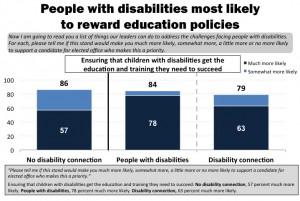 Washington, D.C. – A survey of 900 likely 2016 voters finds that by an overwhelming majority, voters are more likely to support a candidate who prioritizes a series of policies to advance opportunities for people with disabilities. More than 8 out of 10 voters are more likely to support a candidate who prioritizes “ensuring that children with disabilities get the education and training they need to succeed;” 61 percent are much more likely to support the candidate.
Washington, D.C. – A survey of 900 likely 2016 voters finds that by an overwhelming majority, voters are more likely to support a candidate who prioritizes a series of policies to advance opportunities for people with disabilities. More than 8 out of 10 voters are more likely to support a candidate who prioritizes “ensuring that children with disabilities get the education and training they need to succeed;” 61 percent are much more likely to support the candidate.
Only 65 percent of youth with disabilities graduate high school, 19 percent less than students without disabilities, a White House study found earlier this month. Youth who do not graduate high school are more likely to be involved in the criminal justice system and have a more difficult time entering the workforce.
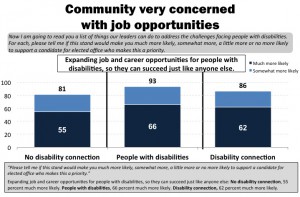 Similarly, 84 percent are more likely to support a candidate who prioritizes “expanding job opportunities for people with disabilities, so they can succeed just like anyone else;” 59 percent are much more likely to do so.
Similarly, 84 percent are more likely to support a candidate who prioritizes “expanding job opportunities for people with disabilities, so they can succeed just like anyone else;” 59 percent are much more likely to do so.
Only one in three working-age Americans with a disability has a job, despite the fact that studies show that 70 percent of the 21-million working-age people with disabilities are striving for work. More than 78 percent of non-disabled Americans are employed.
“Our nation was founded on the principle that anyone who works hard should be able to get ahead in life,” said Jennifer Laszlo Mizrahi, president of RespectAbility, a nonprofit organization advancing opportunities for people with disabilities. “People with disabilities deserve the opportunity to earn an income and achieve independence, just like anyone else. Companies including Amazon, Starbucks, Pepsi and others have shown that employees with disabilities are loyal, successful and help them make more money. If we find the right jobs for the right people, it can and does increase the bottom line of companies.”
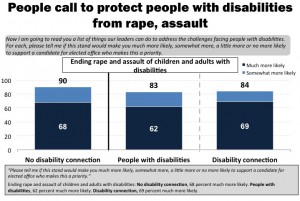 On the issue of “ending rape and assault of children and adults with disabilities,” voters are 87 percent more likely to support a candidate who makes this issue a priority.
On the issue of “ending rape and assault of children and adults with disabilities,” voters are 87 percent more likely to support a candidate who makes this issue a priority.
People with disabilities are twice as likely to be victims of crime than people without disabilities. People with disabilities between the ages of 12-15 and 35-49 were three times more likely to be victims of violent crimes.
Said Stan Greenberg, Ph.D., “This survey is a big lesson in how many people are affected by disabilities and how much it matters for elected officials to hear their very clear message. They too want politicians to do something about the risks they face and our founding principles: anyone who works hard should be able to get ahead in life. Ending rape and assault and expanding job and career opportunities matters for the partisans but most of all, for the undecided in this year’s congressional elections. They want to be heard.”
Likewise, Republican Whit Ayres commented, “We are accustomed to thinking about ‘soccer moms,’ ‘Hispanics’ or ‘values voters.’ But this poll shows that Americans with disabilities – and those who care deeply about them – are a demographic we need to pay attention to in the future.”
“Today, children with disabilities are three times more likely to be victims of rape or sexual assault than children without disabilities,” commented Mizrahi. “Every nine minutes an adult with a disability is sexually assaulted or raped. Growing up as a young adult with a disability, I know personally how traumatic this is. As a survivor of rape, it is incredibly reassuring to know how seriously voters view this problem and how it impacts their voting behavior.”
Strong majorities of likely voters also are more likely to support candidates who prioritize other policies to advance people with disabilities, including, “standing up against Hollywood bigotry and negative portrayals of people with disabilities (65%), ensuring that criminal justice reform specifically addresses the issues of the 750,000 people with disabilities incarcerated in America (58%), promoting positive media portrayals of people with disabilities in TV, Hollywood movies and books (58%).
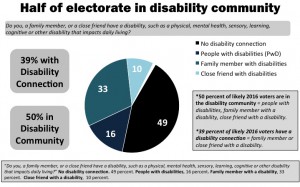 More than half of voters report that they themselves have a disability (16%), have a family member with a disability (33%), and/or have a close friend with a disability (10%).
More than half of voters report that they themselves have a disability (16%), have a family member with a disability (33%), and/or have a close friend with a disability (10%).
The Democratic polling firm Greenberg Quinlan Rosner and the Republican polling firm North Star Opinion Research conducted this bipartisan survey phone survey of 900 likely 2016 voters. This survey took place October 21-24 among national likely voters. Likely voters were determined based on stated intention of voting in 2016, and vote history in 2012 and 2014. Data shown in this deck is among all 2016 likely voters unless otherwise noted.
Margin of error for the full sample is +/-3.27 percentage points at the 95 percent confidence level. Of the 900 respondents, 65 percent were interviewed via cell phone in order to accurately sample the American electorate.
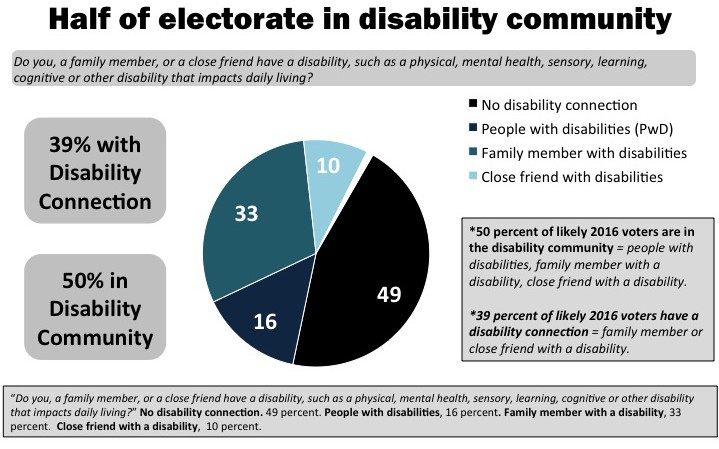
[…] Nov. 4 – A new poll shows that voters are more likely to support candidates who prioritize education, employment and […]
I thought that this poll addressing disability issues was especially relevant. I was interested that this survey found that voters are more likely to support a candidate who prioritizes and supports policies to advance opportunities for people with disabilities.
[…] Americans), more than 35 million of whom are eligible voters (one-sixth of the electorate). A new poll showed that half of voters either have a disability or a loved one with a disability. The poll also […]
[…] Americans), more than 35 million of whom are eligible voters (one-sixth of the electorate). A new poll showed that half of voters either have a disability or a loved one with a disability. The poll also […]
[…] Americans), more than 35 million of whom are eligible voters (one-sixth of the electorate). A new poll showed that half of voters either have a disability or a loved one with a disability. The poll also […]
[…] Americans), more than 35 million of whom are eligible voters (one-sixth of the electorate). A new poll showed that half of voters either have a disability or a loved one with a disability. The poll also […]
[…] Americans), more than 35 million of whom are eligible voters (one-sixth of the electorate). A new poll showed that half of voters either have a disability or a loved one with a disability. The poll also […]
[…] Americans), more than 35 million of whom are eligible voters (one-sixth of the electorate). A new poll showed that half of voters either have a disability or a loved one with a disability. The poll also […]
[…] Americans), more than 35 million of whom are eligible voters (one-sixth of the electorate). A new poll showed that half of voters either have a disability or a loved one with a disability. The poll also […]
[…] for people with disabilities (PwDs) won big Tuesday night – confirming the results from a new poll released last week. The poll showed that voters were more likely to support candidates who […]
[…] for people with disabilities (PwDs) won big Tuesday night – confirming the results from a new poll released last week. The poll showed that voters were more likely to support candidates who […]
[…] Americans), more than 35 million of whom are eligible voters (one-sixth of the electorate). A new poll showed that half of voters either have a disability or a loved one with a disability. The poll also […]
[…] A new poll showed that half of voters either have a disability or a loved one with a disability. The poll also showed that voters were more likely to support candidates who prioritize ensuring that children with disabilities get the education and training they need to succeed as well as expanding job and career opportunities for people with disabilities. […]
[…] A new poll showed that half of voters either have a disability or a loved one with a disability. The poll also showed that voters were more likely to support candidates who prioritize ensuring that children with disabilities get the education and training they need to succeed as well as expanding job and career opportunities for people with disabilities. […]
[…] winning Senate campaigns touted their work on disability issues in television ads as a new poll shows that addressing disability issues is a winning campaign […]